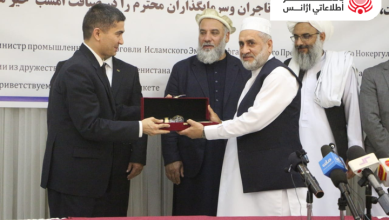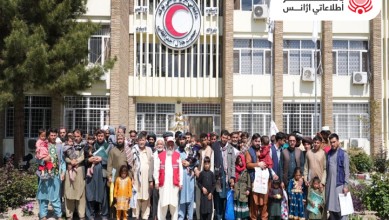
Kabul (BNA) Nangarhar Governor says that the International Committee of the Red Cross (ICRC) has transferred death bodies of 39 Pakistanis killed in Afghanistan clashes, to the neighboring country via Torkham crossing.
Zia-ul-Haq Amarkhail, as quoted by provincial press office the other day, added that these Pakistanis were fighting for Taliban militants. He also said that in addition to the official transfer of these bodies, dozens of other Pakistanis’ death and injured bodies being transferred to the neighboring country through various unofficial routes.
The governor of Nangarhar said Afghan forces are defending their country and if anyone comes to Afghanistan for war and looting, their lifeless body will be returned back.
This comes as spokesman for Ministry of Defense, Rohullah Ahmadzai, in a Facebook post said yesterday that dozens of Punjabi death bodies are being transferred to Pakistan on daily basis by ICRC.
“The result of standing against Afghan forces, dozens of Punjabi death bodies that have come to Afghanistan to fight Afghan forces are being transferred to Pakistan via ICRC and on daily basis,” he wrote in a Facebook post.
This comes as videos of Pakistani citizens holding Taliban flags and chanting Islamist slogans at rallies to show support for the insurgents have been circulating on social media. Pakistani clerics in various parts of the neighboring country are also soliciting support for the Taliban and calling for donations.
Many locals and witnesses in the city of Quetta and district of Pishin of Baluchistan province told DW last week that there had been an increased pro-Taliban activity in their areas.
“The Taliban enjoy local support in our area, but the rallies are not possible without support from state authorities,” a resident told DW on condition of anonymity. “Initially, the clerics were asking for donations for the Taliban at mosques; now they are coming door-to-door to generate funds for the ‘Afghan jihad,'” he said.
The last time Abdul Rasheed’s family saw him alive was in May, when the young Pakistani left for Afghanistan to fight for the Taliban. He returned home last week in a cardboard coffin.
Pakistan’s interior minister earlier this month publicly acknowledged that the families of Afghan Taliban fighters were living in the country’s capital, while members of its rank-and-file were brought to the country for medical treatment or to be buried. Pakistan has a long, complicated history with the Taliban.
For decades, Pakistani madrassas have served as incubators for militancy, indoctrinating tens of thousands of refugees who have few other options for education than the fire-breathing lectures from hardline clerics.
Rather than crack down on the institutions, successive governments in Islamabad — who rely on the support of Islamist parties in coalition governments — have largely given the madrassas a free hand.
Rasheed’s family do not know exactly when or where he died, only that it happened somewhere in eastern Nangarhar province, according to a report by AFP, quoting two police sources in Khyber Pakhtunkhwa province that four dead bodies of Pakistani fighters had arrived from Afghanistan in recent weeks.
Meanwhile, Mohsin Dawar, a progressive opposition lawmaker from Pakistan’s northwestern tribal areas, said that “the Taliban continue to roam freely in different parts of Pakistan, including Quetta.” “It is not possible without the state’s support,” he said earlier last week.
The Tehrik-e-Taliban Pakistan (TTP) is officially banned in the country, but experts say Islamabad’s alleged support to the Afghan Taliban is giving impetus to the outfit.




